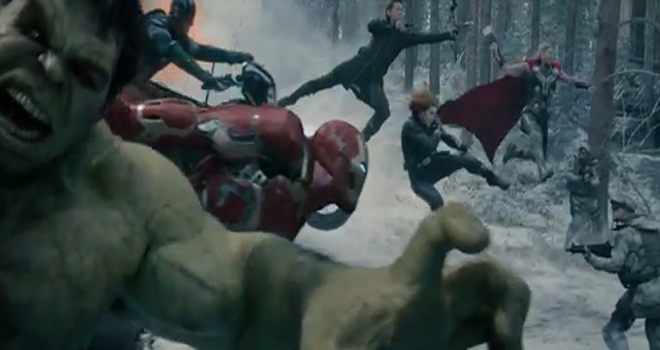Brad Bird's Tomorrowland released in theaters last week and my expectations couldn't have been higher. Not because of the movie, per se, though the trailer piqued my attention. I'm here for Mr. Bird, one of my favorite directors, whose films are cemented into the highest echelon of my esteem. I consider The Incredibles and The Iron Giant to be animated classics (the latter is one of my top five all-time favorites). Ratatouille won the 2007 Oscar for Best Animated Feature, and Mission Impossible: Ghost Protocol received acclaim from critics and audiences alike. Whatever this man touches is supposed to be gold, so I'm going to blame the following statement partly on the detriment of heightened expectations: Tomorrowland is just ok.
Casey Newton (Britt Robertson) is an engineering prodigy, an optimist with an endless drive to find solutions to seemingly insolvable problems. When she discovers a mysterious pin that shows flashes of a futuristic, technologically advanced city, she embarks on a journey to find it. This leads her to Frank Walker (George Clooney), an embittered scientist exiled from the city, which he tells her is named Tomorrowland.
 Walker, using Tomorrowland's technology, is able to look into the future, which showcases a series of cataclysmic events - natural disasters, wars, climate change - signaling, with 100% probability, the end of Earth as we know it. However, Casey's refusal to accept defeat makes the probability drop to 99.994%, a slight shift, but a phenomenon that hasn't occurred, Frank says, in decades. Inspired by the little drop of hope, the two team up to travel to Tomorrowland and try to save the future before time runs out.
Walker, using Tomorrowland's technology, is able to look into the future, which showcases a series of cataclysmic events - natural disasters, wars, climate change - signaling, with 100% probability, the end of Earth as we know it. However, Casey's refusal to accept defeat makes the probability drop to 99.994%, a slight shift, but a phenomenon that hasn't occurred, Frank says, in decades. Inspired by the little drop of hope, the two team up to travel to Tomorrowland and try to save the future before time runs out.
For Tomorrowland, the phrase "mixed bag" comes to mind - a smattering of plot elements, characters, effects, and scenes held by broad themes of perseverance and optimism. The result is an complicated plot meant to serve a message understood in the first ten minutes. My explanation above didn't include both Casey and Frank's backstories, who gave Casey the pin and why, the history of Tomorrowland, the cause of the dark future and how Casey can influence its probability. The film pushes forward, expediting backstories and motives, rarely allowing time to breathe and let these elements sink in. It's easier to tune out exposition until the next action scene or major development, so in cramming the details, Tomorrowland ironically drags along.
It's difficult to pinpoint who Tomorrowland is aimed at. The PG rating is a wide umbrella to work with, but it's a tad jarring to juxtapose goofy comic relief with decapitated androids, Casey bumbling down stairs mixed with scenes of extras mercilessly vaporized. Casey's wide-eyed optimism borders on naivete for someone old enough to drive; Young Frank (Thomas Robinson) delivers his lines as if he were performing on a sitcom. These characters come off more like Disney Channel stars than real teenagers and kids. And that's not to say Brad Bird doesn't know how to write children. In The Iron Giant and The Incredibles, children are ambitious and optimistic, but they're also awkward, insecure; they speak like real kids, with a looseness that doesn't only serve plot development. In Tomorrowland's efforts to present its themes, it sacrifices the grounded characters we've grown to know and love from Bird's previous works.
Where Tomorrowland exceeds expectations, however, is in its production value. This is a gorgeous movie: bright and bursting at the seams with color. From the golden fields surrounding Tomorrowland to the 1964 World's Fair, each set sucks me in, combing all over the screen to take it all in. Integrate a 50's/60's sci-fi vibe, similar to comic books of the era, and you've drawn me in. The action takes advantage of the genre, throwing out inventive gadgets (including a flying bathtub) as Casey and Frank outwit their enemies. These scenes are expertly orchestrated and are the best pieces of the puzzle.
The actors are likable, and the action and visuals are commendable, but at the end of the day, the story's sloppy with the details and too simple with its ideas. Innovation requires more than motivation to truly impact our world. Tomorrowland overly simplifies inspiration's effect on a creative process; by doing so, it places more emphasis on desire than effort. These elements should be balanced out if one's to avoid passing the intellectual buck to the next generation of innovators and inventors. However, for how awkward the message comes out, I don't believe Tomorrowland has ill intentions, rather weak execution. It is an original story; I only wish it could live up to the caliber of Brad's other work.
Thank you all for reading; I'm the Man Without a Plan, signing off.





